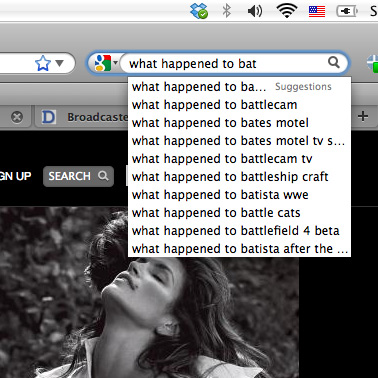the destroyer > cheap papers > Drew Krewer
BATTLECAM, LIFECASTING, AND THE FUTURE OF REALITY TELEVISION

We stumbled across it, and for a moment it almost looked like CNN. BATTLECAM was emblazoned across the top of the television. At the bottom, there was rolling text, a ticker of sorts, and a cascading chat room feed on the left side of the screen. The main portion of the screen was split, on either side of the divide were strangers on their webcams. Think Chatroulette broadcasting live on cable.
The two sides of the screen seemed to be battling for votes, which ultimately led to money. The one with the least votes would vanish from the screen, only to have someone else appear in their place. People were battling each other—yo-mama style but with more profanity. Sometimes a guy drinking a milkshake would pop on screen and only a portion of his face––a giant eye and nose and mouth––filled the screen. Lips and a straw and some dairy. There were people by a bonfire who would occasionally come back (I guess by popular demand?), and they'd be dancing and throwing things into the fire.
This was the screen of the future. A screen comprised of a collision of screens. The Net became television, and the television became some person in their house drinking a milkshake, and we were the people watching it.
Alki David, the billionaire founder of Battlecam, considers it a "lifecasting" project, and I suppose that's a pretty accurate description. 1 The fairly unmediated lives of others are parading in front of us in the most exaggerated of ways. Take, for example, this guy named Ayyone. If Battlecam has its celebrities, Ayyone must be one of them.
Something was seriously unsettling about the channel; it was disturbing how people were treating each other, and one was left to wonder what this platform would entail if it aired nationally, beyond the small, exclusive broadcasting region of the Los Angeles metro area. One man set himself on fire to earn a spot in "Battlecam House 2" and was air lifted to a medical center. This man standing in his own backyard was willing to destroy himself for the entertainment of others. It seems like something out of a dystopian future:
As if this weren't horrifying enough, Battlecam (or rather Alki David) paid for the rights to livestream a legally assisted suicide from a hospital in Switzerland. One article states:
The terminally ill man Mr. Nikolai Ivanisovich said in an interview with Russia Today that, "I am grateful to Mr. David and his team for making this possible. My family will be able to live in prosperity after I pass. May God bless Mr. David for his kindness and generosity."
"We are creating a new form of interactive special interest with Battlecam's unique voting system," said Alki David. "the online audience will actually vote whether they want to see the suicide or not."2
By the time I found out about the fire guy and the assisted suicide, Battlecam had gone off the air, at least on television. It has been replaced with an ongoing stream of infomercials, 24/7. My fascination with Battlecam's structural concept abruptly shifted to a fascination with its erasure.

Apparently, Battlecam is part of a bigger picture––the free, online TV streaming site/station FilmOn, which has been embroiled in a copyright battle with Fox, ABC, and NBC over rights to "re-broadcast" the networks in realtime online. This battle has been reported in numerous sources, all apparently bloglike and not at all authoritative, as if the coverage had been paid for, which is highly possible. Though I couldn't find any conclusive evidence as to why it went off the air, I found mountains of other information:
The bodybuilding.com forums are suggesting that David is profiting off the death of one of Battlecam's members by purchasing a domain "Zyzzisdead.com" and redirecting it to Battlecam.
Google Earth images were used by authorities to find the marijuana garden of one of Battlecam's leading personalities.
An online fight leaked its way into the physical world via Battlecam. Some man from Illinois is suing a fellow Battler for sending tons of pizzas, ordering male prostitutes, and sending the cops to his doorstep.
Janice Dickinson even made an appearance:
All bizarre guests and disturbing content aside, Battlecam is tapping into something. It takes the construct of reality television and pushes it one step further––into the realm of the social, the interactive. Like any entity of capitalism, continued growth must be seen in a pop medium in order for it to remain relevant and desirable to the masses; it makes sense that reality television's next logical step is lifecasting. What will be interesting is to see how brand is negotiated, however, since participants create the content. This may lead to some sort of screening process or, on the most absurd level, to actors who create the illusion of a public interacting with the reality interface.
With all the real people on Battlecam, I have to wonder if they understand how widely their image is being broadcast. If the nationwide streaming of one's private life over the Net feels somehow isolated and local. Or if it's just the opposite––the feeling of celebrity. Maybe they believe someone will notice them in the supermarket. Or maybe they're just curious, like me.

1 http://www.themodule.com/work/alki-david-battlecam/index.html








